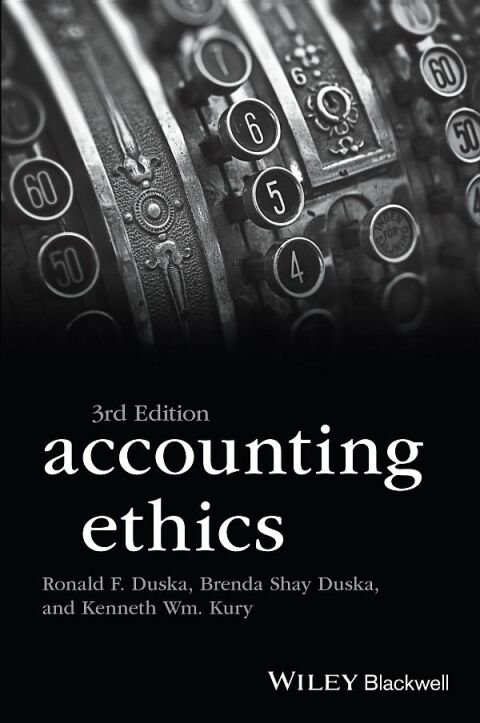Description
Efnisyfirlit
- Cover
- Title Page
- Copyright
- Preface to the Third Edition
- Introduction to Accounting Ethics
- Note
- Chapter One: The Nature of Accounting and the Chief Ethical Difficulty
- The Nature of Accounting
- Ethics of Disclosure
- The Financial Statement
- Roles an Accountant can Fulfill
- Development of Explicit Accounting Standards and Regulations
- The Sarbanes–Oxley Act (SOX)
- Recent Scandals that Provoked More Regulation
- Conclusion
- Discussion Questions
- In the News
- Notes
- Chapter Two: Ethical Behavior in Accounting
- What is Ethics?
- Ethics: The Intellectual Enterprise
- Actions
- Social Practices, Institutions, and Systems
- Why Study Ethics?
- Being Ethical: How to Determine What to Do
- Questions to Ask to Justify an Action: The Basis of Ethical Theory
- Is the Action Good for Me?
- Is the Action Good or Harmful for Society?
- Is the Action Fair or Just?
- Does the Action Violate Anyone’s Rights?
- Have I Made a Commitment, Implied or Explicit?
- Using the Reasons
- Ethical Dilemmas
- Some Classic Moral Dilemmas
- Discussion Questions
- In the News
- Notes
- Chapter Three: Ethical Behavior in Accounting
- Egoism
- Utilitarianism
- Kant and Deontology
- Deontological Ethics
- The First Formula of the Categorical Imperative
- The Second Formula of the Categorical Imperative
- Virtue Ethics
- Discussion Questions
- In the News
- Notes
- Chapter Four: Accounting as a Profession
- Discussion Questions
- Notes
- Chapter Five: Accounting Codes of Conduct
- AICPA Professional Code of Conduct
- Code Principles
- 0.300.020.01 – Responsibilities Principle
- 0.300.030.01 – The Public Interest Principle
- 0.300.040.01 – Integrity Principle
- 0.300.050.01 – Objectivity and Independence Principle
- 0.300.060.01 – Due Care Principle
- 0.300.070.01 – Scope and Nature of Services Principles
- Criticisms of the Code of Conduct
- Discussion Questions
- In the News
- Notes
- Chapter Six: The Rules of the Code of Conduct
- Conceptual Framework
- Sub-section 100: Integrity and Objectivity Rule
- Sub-section 200: Independence Rule
- Section 1.300.001: General Standards Rule
- Sub-section 400: Acts Discreditable
- Sub-section 500: Fees and Other Types of Remuneration Rule
- Sub-section 600: Advertising and Other Forms of Solicitation Rule
- Sub-section 700: Confidential Information Rule
- Sub-section 800: Form of Organization and Name Rule
- Responsibilities to Colleagues
- Discussion Questions
- In the News
- Notes
- Chapter Seven: The Auditing Function
- The Ethics of Public Accounting
- Trust
- The Auditor’s Responsibility to the Public
- The Auditor’s Basic Responsibilities
- Independence
- Independence Risk
- Professional Skepticism
- Reasonable Assurance
- Discussion Questions
- Notes
- Chapter Eight: The Ethics of Managerial Accounting
- Reasons Used to Justify Unethical Behaviors
- Blowing the Whistle
- Discussion Questions
- Notes
- Chapter Nine: The Ethics of Tax Accounting
- Discussion Questions
- In the News
- Notes
- Chapter Ten: Ethics Applied to the Accounting Firm
- Accounting as a Business
- The Social Responsibility of Business
- Good Ethics is Good Business
- Ethical Responsibilities of Accounting Firms
- The Accounting Profession in Crisis
- Discussion Questions
- In the News
- Notes
- Appendix A: Summary of Sarbanes–Oxley Act of 2002
- Appendix B: IMA Statement of Ethical Professional Practice
- Principles
- Standards
- I. Competence
- II. Confidentiality
- III. Integrity
- IV. Credibility
- Resolving Ethical Issues
- Note
- Index
- End User License Agreement







Reviews
There are no reviews yet.